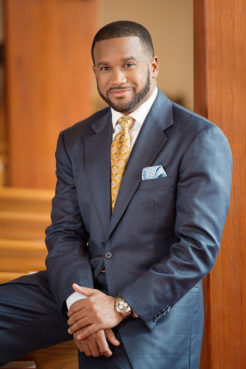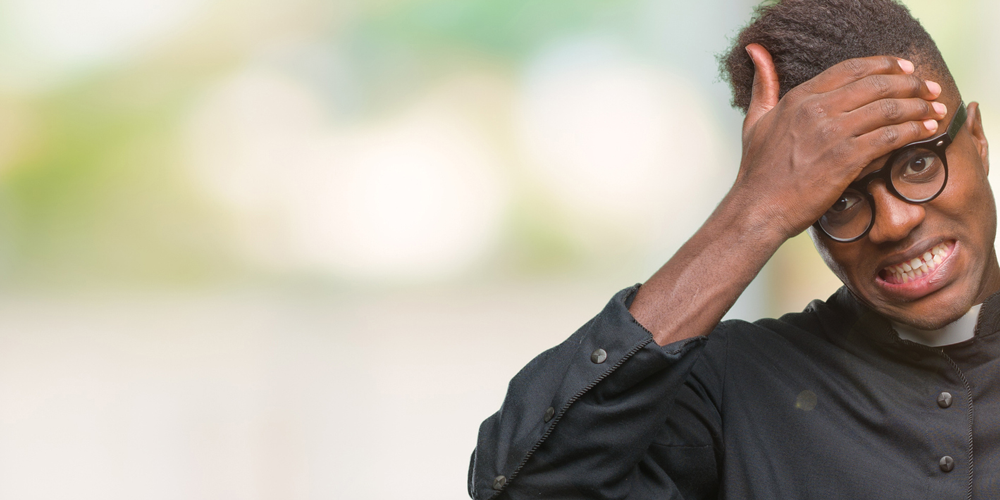Anyone familiar with the schedule kept by the Rev. Howard-John Wesley, pastor of Alfred Street Baptist Church in Alexandria, Virginia, was not likely surprised by the news that he is stepping away to take a much-deserved sabbatical. Rev. Wesley was known to be on call to answer his parishioners’ needs 24 hours a day.
I’m grateful that Wesley, in announcing his sabbatical, also shared his reasons for it — feeling far from God, tired in his soul and needing to recuperate mentally and physically. I hope his message reaches beyond his church and denomination and spurs action for kindred clergy who find themselves having similar feelings.

The Rev. Howard-John Wesley. Photo by Dave McIntosh, courtesy of Alfred Street Baptist Church
In 2015, 52 church-appointed Methodist pastors agreed to be interviewed by me and my fellow researchers at the Duke Clergy Health Initiative, write down what they did every hour of every day for a week and score their activities for meaning and enjoyment.
In this study and others, including a survey that compared 1,726 clergy to thousands of other North Carolinians, we found above-average rates of depression, obesity and chronic diseases, all of which are substantiated by other researchers who studied clergy of other denominations. One reason for these poor health patterns is how clergy respond to the demands of ministry; their call is so sacred that they often stretch themselves too far.
We also found that, not only can clergy combat burnout, they can flourish in their vocation.
By comparing the behavior of flourishing clergy and those experiencing burnout, we were able to identify four strategies for clergy to flourish: caring for their physical and mental health, setting boundaries for their work and personal lives, nourishing friendships and mutual relationships, and working in alignment with God.
Taking care of one’s health is a particular challenge when a pastor’s schedule is at the mercy of parishioners’ needs. Flourishing clergy not only proactively made plans to attend to their physical, mental and spiritual well-being, but also made backup plans to adjust for their unpredictable schedules: If a meeting preempts plans to attend a morning exercise class, walk with a parishioner at lunch. Called away for a hospital visit? Then play basketball with the youth group in the evening. They also reported finding time to practice spiritual devotions and walk in nature.
We found that flourishing pastors reminded themselves often of where God was leading them, especially when they faced criticism. The work of clergy is quite visible, and parishioners sometimes feel free to disapprove of their pastor’s message and say so publicly, immediately after pastors have poured their hearts out from the pulpit.
After hearing criticism, pastors who experienced burnout in our study reported feeling distressed. Those who were flourishing recognized the criticism and worried only if it related to God’s larger goals for their work.
We all know that friendships and social support are important, but in our study those hourly activity logs that clergy completed during the research revealed that only flourishing clergy took the time to share the joy of their small successes with friends and family.
We’ve also found that parishioners play an important role in clergy well-being. The clergy who do best have parishioners who remember they are human.
If you’re a parishioner, you can ask your pastors about their family, their interests, their vacation plans. Suggest that your pastor have a guest preacher any time a month has five Sundays. Encourage your pastors to keep Sabbath and then remember what day of the week their Sabbath is, and don’t schedule any non-emergency work on that day.
Think about how you would like to receive constructive criticism and offer it the same way, perhaps over a cup of coffee that you buy and with an offer to help.
My heartfelt wishes for health to Rev. Wesley, then, and to those reading this: these lessons about clergy, I suspect, pertain to us all. We are more likely to flourish if we share our joy with others, have back-up plans for healthy activities, and align ourselves with a greater purpose.
(Rae Jean Proeschold-Bell is an associate professor at the Duke Global Health Institute and research director of Duke Divinity School’s Clergy Health Initiative. The views expressed in this commentary do not necessarily reflect those of Religion News Service.)


